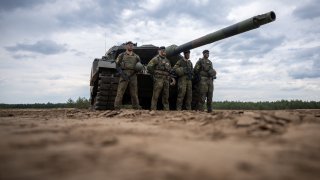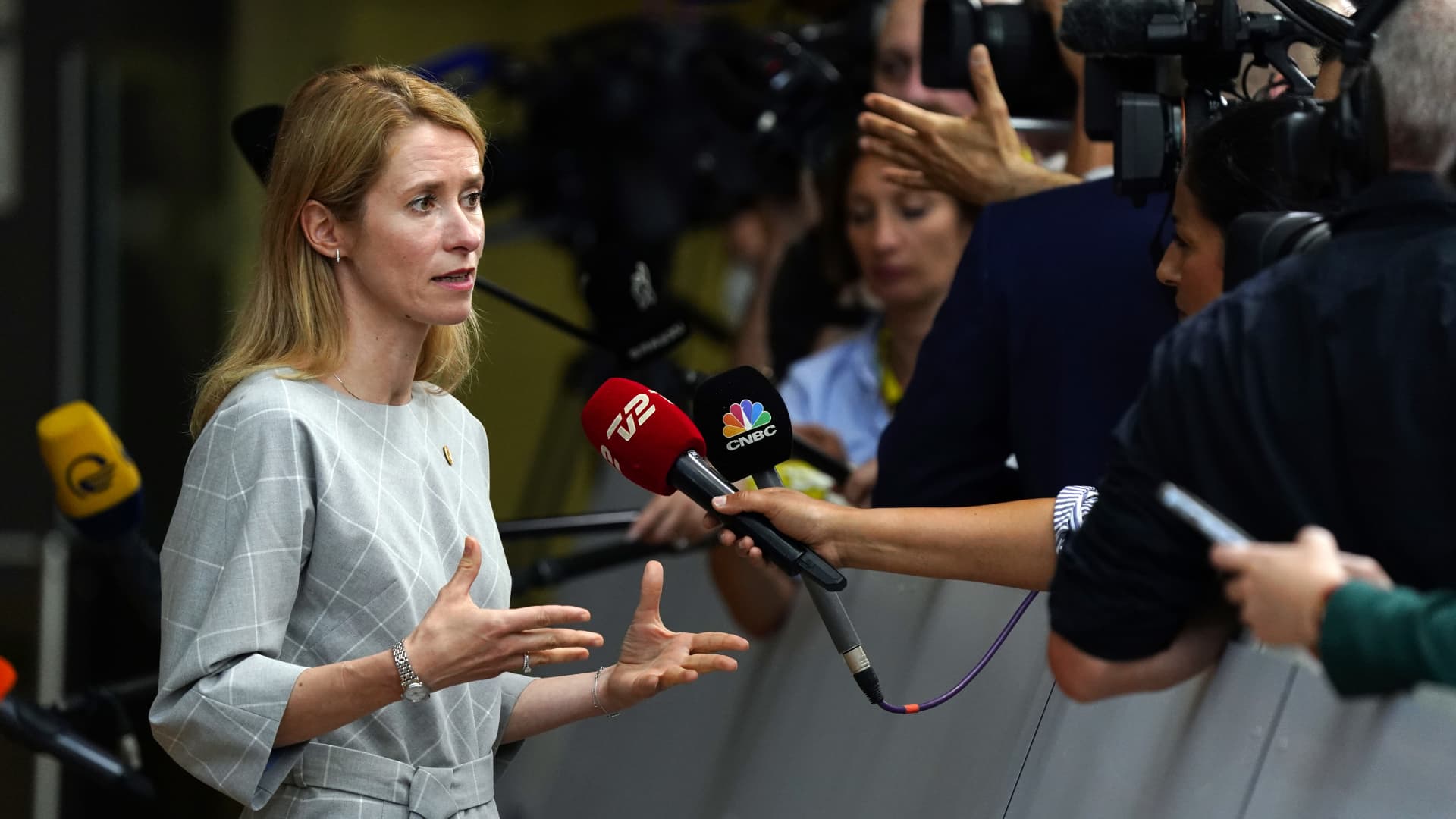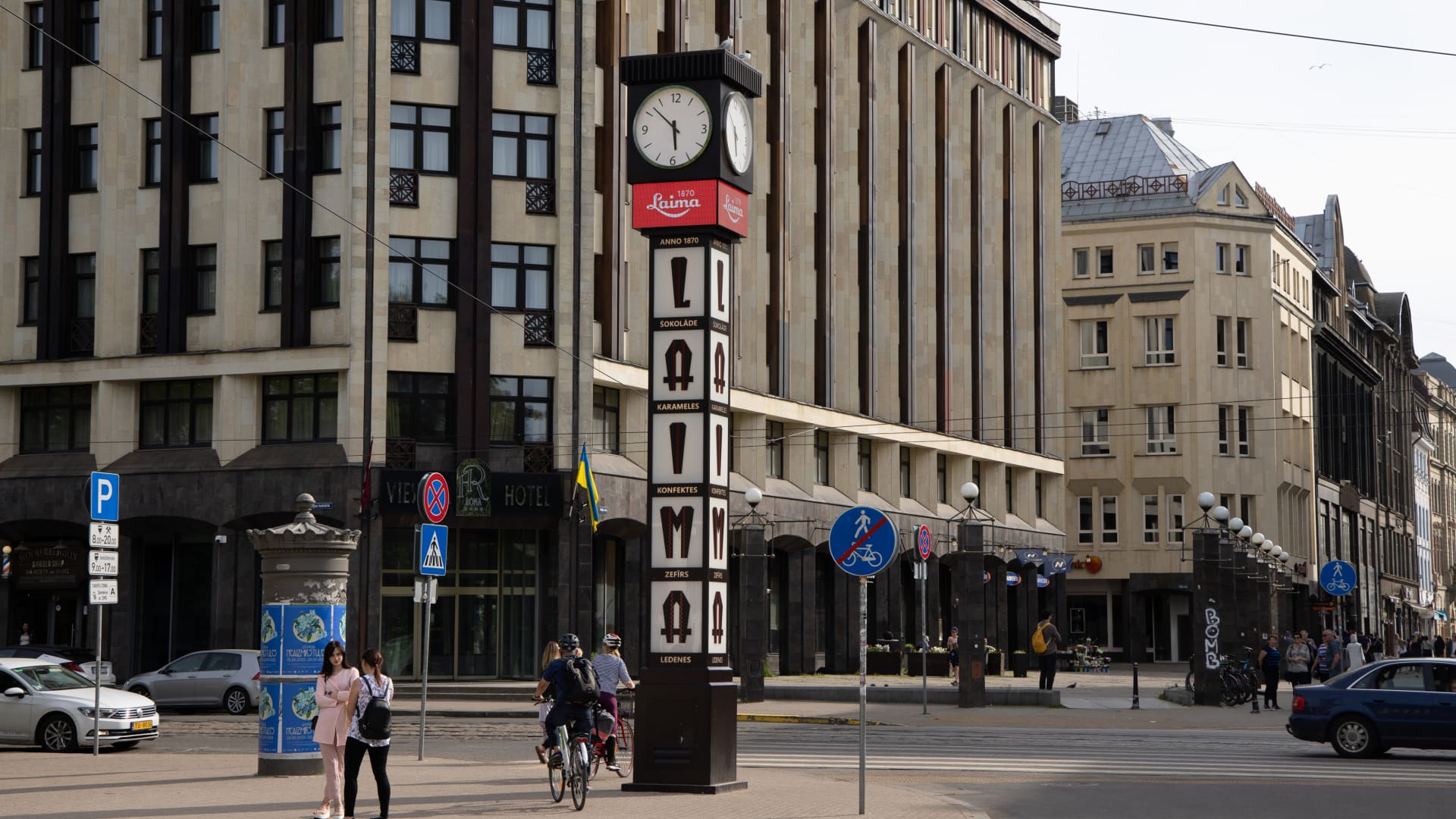
- Bolstering the defense of the Baltic region is seen as one of the most important decisions for NATO leaders to take at the group's June 29-30 summit.
- The 30-member military alliance is poised to reflect on how the group can respond to Europe's new security reality in the wake of Russia's onslaught in Ukraine.
- "We need to move to deterrence by denial. We need a credible military construct on the Eastern flank that will deter Putin," a spokesperson at Estonia's foreign ministry told CNBC.
Everything changed when Russia invaded Ukraine and NATO's defense strategy must now account for the new security environment on Europe's eastern flank. That's the coordinated message from the three Baltic countries of Estonia, Latvia and Lithuania ahead of NATO's all-important Madrid summit this week.
Bolstering the defense of the Baltic region is seen as one of the most important decisions for NATO leaders to take at the group's June 29-30 summit.
The 30-member military alliance is poised to reflect on how the group can respond to Europe's new security reality.
Get New England news, weather forecasts and entertainment stories to your inbox. Sign up for NECN newsletters.
Russia's onslaught in Ukraine, now into its fifth month, has ratcheted up fears throughout the Baltic countries that they may be President Vladimir Putin's next military target.
Member states of both NATO and the European Union, Estonia, Latvia and Lithuania have repeatedly called on NATO to provide a substantial increase in the number of foreign troops stationed in the region following Russia's invasion of Ukraine on Feb. 24.
The Baltic countries have also pushed for an urgent update to the alliance's so-called "tripwire" approach.
Money Report
That's because, under NATO's existing strategy, Estonia's Prime Minister Kaja Kallas has warned that the former Soviet state and its historic capital city of Tallinn would be "wiped off the map" in the event of a Russian attack, according to The Financial Times.
Kallas told reporters last week that NATO's tripwire approach, which involves a relatively small number of troops, would likely see Estonia overrun before NATO then took measures to liberate them after 180 days.

"There is a shared understanding that the tripwire approach is obsolete — Bucha and Irpin cannot be repeated," a spokesperson at Estonia's foreign ministry told CNBC, referring to atrocities committed by Russian forces in two western suburbs of Kyiv.
"Simply put, we're saying 'don't come because you will lose. Don't even think of coming,'" they added. "We need to move to deterrence by denial. We need a credible military construct on the Eastern flank that will deter Putin. This should include more Allied presence."
Speaking ahead of the Madrid summit, NATO chief Jens Stoltenberg told The Financial Times that the alliance would "significantly reinforce" Europe's eastern flank and shift its focus from deterring a possible Russian invasion to a full defense of allied territory.
Stoltenberg reportedly said Kallas's comments about the existential threat facing Estonia "reflect her concerns," adding that he had discussed "exactly these issues" with the leaders of Latvia and Lithuania.
NATO's secretary general refused to discuss operational plans regarding the alliance's purported counter-attack strategy of seeking to recapture the Baltic states after 180 days.
"They've been under Soviet rule for decades. They have a history where they have actually learned the hard way what it means to be occupied and invaded," Stoltenberg said, according to The Financial Times. "I accept [Kallas] wants more NATO presence and I can promise her ... more presence."
A new front in Russia-NATO tensions?
Even though the Baltic states have been a part of NATO and the EU since 2004, with all three using the euro as their currency, their geographic location makes them vulnerable. Like Ukraine, they all share a border with Russia.

Notably, while Estonia and Latvia share an eastern border with Russia, Lithuania shares a western border with the Russian exclave Kaliningrad.
Indeed, it is the Kremlin's territorial outpost on the Baltic Sea that has threatened to become a new front of tensions between Russia and NATO.
Earlier this month, Lithuania banned the transit of some EU-sanctioned goods coming from Russia to Kaliningrad, which uses rail links via Lithuania for passengers and freight. The move prompted the Kremlin to warn of "serious consequences" that would make citizens of the Baltic state feel the pain.
Lithuanian President Gitanas Nauseda told Reuters last week that the country was prepared if Russia took the retaliatory step to disconnect it from the regional power grid and said he did not expect Putin to attack.
Nauseda added that he planned to bring up the stand-off with Russia at NATO's Madrid summit, reportedly saying the dispute may help to calm "those who say that we must help Russia to save face — while it threatens us in a cocky manner."
His comments appeared to be a thinly veiled reference to remarks made by France's President Emmanuel Macron, who has faced a backlash for suggesting it would be unwise for the West to humiliate Putin.
A spokesperson for Lithuania's foreign ministry said Europe's new security reality demands that NATO leaders agree on a new baseline for the alliance's posture in the region. This means moving from "forward presence," referred to as deterrence by punishment, to "forward defense," known as deterrence by denial.
NATO's forward presence is a key part of the alliance's current deterrence and defense strategy. It refers to the military presence of multinational NATO forces in the eastern part of the alliance. NATO says the forward presence of allied forces is "defensive, proportionate, transparent and in line with the Alliance's international commitments and obligations."
A potential shift to a forward defense strategy could see NATO significantly bolster the number of allied forces in Europe's eastern flank to ensure that Estonia, Latvia and Lithuania can credibly fight to protect their territories in the event of a Russian invasion while awaiting reinforcement from the broader alliance.
"We seek that NATO's deterrence and defence adaptation takes into account geographic and geopolitical specificities of our region," Lithuania's foreign ministry told CNBC, citing Russia's military superiority in the region, the Kremlin's military integration with Belarus and the "Suwalki corridor" — a 65-kilometer strip of land in Poland along the border with Lithuania.

Estonia, Lithuania and Latvia have all pledged to increase defense spending to 2.5% of gross domestic product, a commitment that would see all three Baltic nations exceed the 2% benchmark set by NATO.
Latvia's foreign ministry told CNBC that strengthening NATO's deterrence and defense posture would be one of the core objectives at NATO's Madrid summit.
"After Russian aggression against Ukraine started, the strategic security environment changed irreversibly across the Euro-Atlantic area," a spokesperson for Latvia's foreign ministry said. "The new reality of today demands a fundamental shift in NATO's long-term deterrence and defence posture."
"Allied commitment to defend every inch of Allied territory fortified by the Article 5 of the Washington Treaty remains ironclad. We will strengthen the posture in ... NATO's Eastern Flank with appropriate Allied presence in the Member states bordering Russia," they added.
A key pillar of the NATO alliance is the concept of collective defense: Known as Article 5, it means that if one member is attacked, it is considered an attack on the entire group with all members committed to protecting each other.
— CNBC's Holly Ellyatt contributed to this report.






